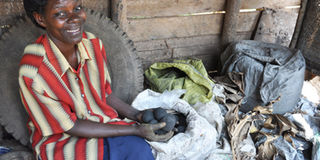Prime
Making briquettes, a viable self-employment avenue

Ms Milly Matovu showing her work of briquettes made using her hands. PHOTO BY EPHRAIM KASOZI
To many people, the only source of income is through getting employment in any organisation despite public pleas that they turn into job creators rather than seekers.
While others are seeking for jobs, many remain uncomfortable with their respective employment citing the conditions ranging from poor remuneration to long hours of work among others.
With the current economic crisis, the cost of doing business has also gone high prompting many people to abandon such initiatives despite their academic qualifications.
According to labour flow statistics at Uganda Investment Authority (UIA) and the Uganda Bureau of Statistics (Ubos), of more than 400,000 Ugandans who enter the labour market each year, only about 113,000 are absorbed in formal employment, leaving the rest to forage for jobs in the informal sector.
Despite the huge number of interventions (both government and private) to address the employment challenges there is an unexploited sector that can absorb a reasonable number of people.
Jude Kabanda, a secondary school teacher, had to abandon his career to become an entrepreneur and an employer in renewable energy for briquette making in a small scale employment center based in Makindye.
He says unlike other jobs and businesses that require paperwork or application letters, with briquette making, one starts from nothing.
Mr Kabanda says briquette making can absorb all family members. “You don’t need huge or expensive capital to start because everything needed for this project to work are available and around us.”
“Although I am a professional, I also trained in biomass technology to make biogas plants, institutional cooking stoves and briquette making machines. I started small with poor quality briquettes but with skills and machines, I am earning depending on the time and resources I invest in the business,” says Mr Kabanda, the proprietor of community based, Friends of the Environment Organisation (FEO), a brainchild of the Global Village Energy Partnership.
Despite the inappropriate technology to support large production, Mr Kabanda says he makes 50 to 100kgs of briquettes daily with each worth Shs1, 000.
“In the city, we use bio-degradable materials. Your energy and time invested determine the output. It takes Shs10,000 without a machine and out of savings, one can buy a machine to improve on production and quality of the products,” he says.
Uganda’s unemployment rate is 3.5 per cent. In the move to supplement government policy to eradicate poverty and unemployment among the youth, GVEP International is working with local energy businesses mainly in rural areas so that they can achieve lasting access to clean and efficient energy.
“As a result of our activity over the past three years, over 500 new jobs were created and an estimated one million people now have improved access to clean energy, whether that is through purchasing a more efficient cooking stove or a solar powered device to light up a room or charge mobile phones,” James Wakaba, the Africa Regional Manager of GVEP International says.
Mr Kabanda who acquired skills through GVEP programmes, which enabled him to perfect his briquette recipe, now uses 50 per cent charcoal dust, 30 per cent sawdust and 20 per cent paper with paper or cassava starch to bind the briquettes together, a combination which produces a much higher quality product than before.
“Our briquettes are now in high demand because of their quality,” says Kabanda whose targeting to purchase a huge machine to increase production capacity.




